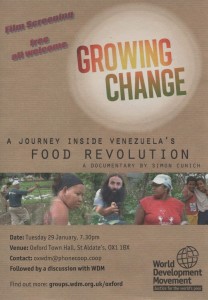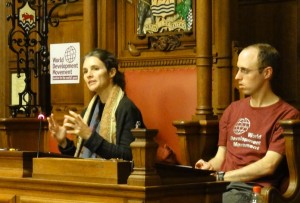Following the UK food sovereignty forum in June 2012, organisers in the South West want to strengthen regional networks. This meeting will be an opportunity for producers & anyone organising for food sovereignty to engage in national and local planning for the food sovereignty movement.
Film screening: Growing Change
Tuesday 29th January, 7:30pm
We will be screening the film Growing Change.
Growing Change is a documentary that looks at one of the most exciting experiments in the world to grow a fair and sustainable food system. In Venezuela, from fishing villages to cacao plantations to urban gardens, a growing social movement is showing what’s possible when communities, not corporations, start to take control of food.
Glyn Thomas, WDM web officer and campaigner, will lead a discussion following the film.
Free, all welcome.
Venue: Oxford Town Hall
Oxford WDM January meeting
Tuesday 8th January, 7:30pm
Monthly meeting discussing upcoming campaigns and activities. Newcomers welcome.
Note change of venue to: The Mitre, High Street, Oxford OX1 4AG
End of year social
Tuesday 11th December, 7:30pm
Join the Oxford WDM group for a year end social. Meet members and chat about development & other issues. Open to all, do join us!
Venue: Head of the River pub
The many dimensions of poverty
Sometimes I’m afraid my son will be killed for something as insignificant as a snack.
That’s what one woman told researchers when they asked her what it means to be poor. Sabina Alkire, director of the Oxford Poverty and Human Development Initiative (OPHI) shared stories like this when she spoke at the Oxford Town Hall last night.
Sabina Alkire (left), with Oxford WDM chair Sam Partington
The research done by OPHI has made one thing crystal clear: poverty cannot be defined by income alone. For a start, it’s difficult to establish what a certain income level actually means in terms of quality of life. One of the many surprising statistics we heard was that in India, 53% of malnourished children are not defined as income-poor. If you looked at income alone, you would conclude that those malnourished children are just fine.
That’s why OPHI, working with the United Nations Development Programme, developed the Multidimensional Poverty Index (MPI). This is intended to measure acute multidimensional poverty and looks at ten indicators across three dimensions: health, education and standard of living. The indicators are then given different weights in the calculation depending on how important they are. A person is considered poor if they are deprived in at least a third of the weighted indicators.
For example, if a child has died in your family, your house has a dirt floor, you cook with dung and it takes you more than 30 minutes to get clean drinking water, you would be defined as MPI poor, or multidimensionally poor.
The question-and-answer session after Sabina’s talk raised some interesting issues. Sabina told us that OPHI are always painfully aware of how “crude” their measure is and how it isn’t necessarily nuanced enough at local or even country level. One way they tried to remedy this was to ask people in different countries to help them out. “We’ve reached out to countries, saying: ‘This is a crude measure. You can do better. Why don’t you do better?’” One response to this request for help came from Kenya. A woman told OPHI that they had to add cooking with charcoal as an indicator. They already had “cooking with wood or dung” as an indicator, but she insisted that charcoal should be included too, because Kenyan people so often suffer respiratory problems as a result of cooking with it.
This point caused some controversy, because – as chance would have it – someone in the audience had actually helped to design a charcoal stove that was widely used in Africa in the 1970s. He made the point that it’s not charcoal itself, but poor stove design that is the problem.
Sabina agreed, pointing out that what you cook with is weighted relatively lightly on the MPI. (If it wasn’t, you might get Aga owners defined as poor!) The point about the MPI is that it looks at clusters of different factors, not just one factor alone, which is why it’s superior to income-based measurements of poverty.
It was clear from the questions asked that many people in the room were already deeply engaged with the issues, which made for a lively and respectful discussion that could have gone on for much longer. As we ran out of time and drew the meeting to a close, it was at least clear that more sophisticated tools for measuring poverty take us one step closer to eradicating it. And for that, we must thank OPHI for its pioneering work.
Kate Griffin, Oxford WDM Campaigner
Next event: end of year social, Tue 11th Dec
What is poverty anyway?
Global anti-poverty campaigner comes to Oxford: Thursday 13th November
What does it mean to be poor? Before we can fight poverty, we need to understand it. International poverty campaigner Sabina Alkire will be speaking at Oxford Town Hall next week about using multidimensional indicators of poverty to build up a detailed picture and advocate effectively for the world’s poorest people.
Dr Sabina Alkire is director of the Oxford Poverty and Human Development Initiative (OPHI). She will be speaking at a free event organised by Oxford World Development Movement (WDM).
Sam Partington, chair of Oxford WDM, said: “Sabina Alkire’s research work with Oxford Poverty & Human Development Initiative is an excellent complement to WDM’s focus on activism and campaigning for a global economic justice, so I’m delighted that this event can bring Sabina’s work to a wider audience.”
“Poverty reduction and global economic justice are two key goals that OPHI and World Development Movement share. This will be a great chance to bring Sabina Alkire’s cutting-edge thinking and research to bear on those aims for which we campaign so hard.”
OPHI is best known for working with the United Nations Development Programme to develop the Multidimensional Poverty Index (MPI), now the standard index for assessing a country’s poverty levels.
The talk will take place on Tuesday 13th November at Oxford Town Hall. 8pm-9:15pm. Entry is free. There will be the opportunity for questions and discussions after the talk.
—-
For more information, interview requests or photographs, contact:
Sam Partington
07754 686168
sam@samsolutions.co.uk


